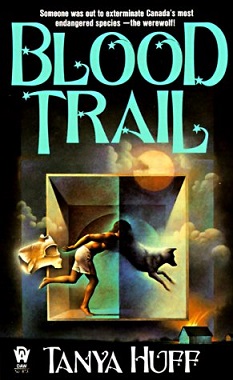
Blood Trail
Tanya Huff
304 pages
published in 1992
What do you call urban fantasy when it moves to the countryside? Because that’s what happens in Blood Trail as Vicky Nelson, ex police officer turned private dick and her vampire partner Henry Fitzroy trade the familiarity of Toronto for the charming wonders of the Canadian countryside. Vicky had met Fitzroy in the first novel of the Blood series, Blood Price, now in the second — as seems to be de rigeour in urban fantasy — she gets involved with werewolves. But these aren’t your average, shirt ripping, feauding with vampires werewolves: these are sheepfarmer werewolves, leading a quiet existence near London, Ontario, just another Dutch-Canadian family. Until somebody starts killing them, somebody who seems to know that they’re werewolves.
Which is when they call Henry Fitzroy, who first met the Heerkens wolf clan during WWII, when he was a member of the British secret service and they were in the Dutch resistance. Because the wer could obviously not involve the police without their secret getting known and since they’re mistrustful of outsiders anyway, Henry was their only option. And Henry of course in turn wanted Vicky to come along and use her investigative talents. Meanwhile, back in Toronto detective Mike Celluci, Vicky’s ex-colleague and still occasional love interest is convinced Henry is hiding something. Of course not knowning he’s a vampire, it may just be jealousy that’s driving his investigation…